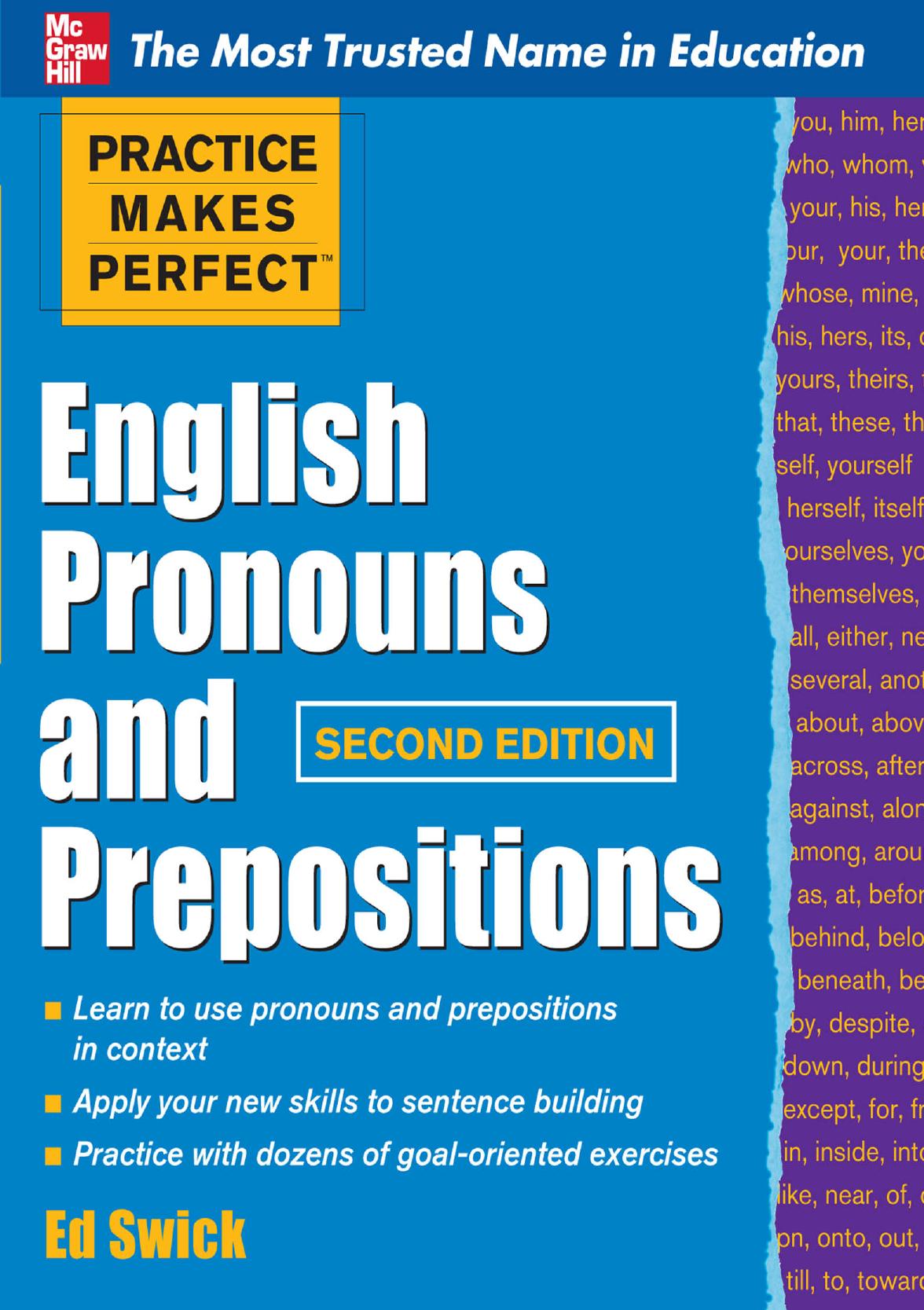Practice Makes Perfect English Pronouns and Prepositions, Second Edition by Ed Swick

Author:Ed Swick [Swick, Ed]
Language: eng
Format: epub, pdf
ISBN: 9780071753876
Published: 0101-01-01T00:00:00+00:00
Kick is a regular verb and means “to strike with a foot.” Look what happens to its meaning when it becomes a phrasal verb.
The phrasal verb to kick off means “to start something” and comes from the start of a football game, which is the kickoff. It has a colloquial meaning that is casual and somewhat crude: “to pass away or die.” This second meaning is used without compassion:
Let’s kick off the meeting with a few words from Ms. Johnson.
The poor old man kicked off during the night.
In this form the verb to kick out (of) means “to evict someone or eject something from a place”: Maria kicked out her boyfriend last night.
I kicked the boxes out of my way.
Prepositions and Phrasal Verbs
83
Knock
This verb is regular. It means “to strike, hit, or rap.”
With the particle down, to knock down means “to hit someone or something to the ground.” Here are some examples:
The bully knocked me down and ran off laughing.
The wind is going to knock down that old fence.
In this form the verb to knock off (it, work) derives a few new meanings: (1) to stop doing something, (2) using the pronoun it to make a rather rude meaning, “to cease a certain behavior,” (3) as a slang expression, “to murder a person,” and (4) using the noun work, “to conclude the day’s work.” As a noun— knockoff—the word means “an imitation.” Some examples: You can knock off digging. The plans have been changed.
Knock it off! Acting like that isn’t funny!
The gangsters knocked off an old enemy.
My father usually knocks off work around 6:00 P.M.
He wanted a Rolex but bought a knockoff from a street vendor.
Look at the meanings that are derived for the verb to knock out: (1) to cause someone to become unconscious, (2) to develop or make something quickly, and (3) to cause something to stop functioning.
Bill hit the man so hard that he knocked him out.
That drink almost knocked me out.
The workers knocked out a prototype in a matter of hours.
A lightning strike knocked out the radio station.
Phrasal Verbs That Act as Nouns
The phrasal verbs to kick off, to knock off, and to knock out have a noun formation:
This party is the kickoff to a week of celebrating.
This isn’t a Cartier. It’s a knockoff.
The champ won the boxing match by a knockout.
84
Prepositions
exercise
21-5
Select the word or phrase that best completes each sentence.
1. You run too fast. I can’t keep up with/to/out of you.
2. With one blow, he knocked the man on/out/it off.
3. We have to keep on/kick off/keep to working until we’re done.
4. The landlord kicked us up with/off/out of our apartment.
5. Knock it/out/yourself off. You’re bothering me.
6. The carpenters knocked down/kicked out of/kept up with the wall in just a few minutes.
7. They kicked out/out of/off the parade with a patriotic march.
8. He was shot in the morning. He kicked off/to/up with in the afternoon.
9. What time do you knock out/off/up with work?
10. She’s so lonely, yet she still keeps up with us/off it/to herself.
exercise
21-6
Fill in
Download
Practice Makes Perfect English Pronouns and Prepositions, Second Edition by Ed Swick.pdf
This site does not store any files on its server. We only index and link to content provided by other sites. Please contact the content providers to delete copyright contents if any and email us, we'll remove relevant links or contents immediately.
Housekeeping by Marilynne Robinson(4425)
Papillon (English) by Henri Charrière(4239)
The Poetry of Pablo Neruda by Pablo Neruda(4082)
World without end by Ken Follett(3460)
TCP IP by Todd Lammle(3170)
Fluent Forever: How to Learn Any Language Fast and Never Forget It by Gabriel Wyner(3068)
The Rape Of Nanking by Iris Chang(2805)
How Proust Can Change Your Life by Alain De Botton(2792)
The Alchemist by Paulo Coelho(2684)
The Partner by John Grisham(2388)
Two lives by Helen Naylor(2295)
Hitler by Ian Kershaw(2186)
Yerma by Federico García Lorca(2054)
Sophie's World by Jostein Gaarder(2012)
Smilla's Sense of Snow by Peter Hoeg(1929)
Merriam-Webster's Pocket Dictionary by Merriam-Webster(1921)
Twilight of Idols and Anti-Christ by Friedrich Nietzsche(1885)
Il cavaliere inesistente by Italo Calvino(1843)
Deep Writing by Eric Maisel(1812)
